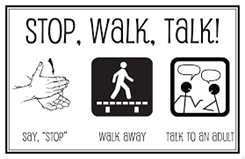
Archbishop Ilsley Catholic School believes that bullying in all forms is undesirable and totally unacceptable. We all have a duty to work together to protect vulnerable individuals from bullying and other forms of abuse. This is because everyone has the right to work and learn in an atmosphere that is free from fear without negative effects on their learning, teaching or emotional wellbeing. Where a persistent and intentional in-power of balance is evident with the intention of harm either emotionally or physically then we must act to eradicate such behaviours from our community.
We are all God’s children, valued as such and must be treated accordingly. Therefore, we recognise that:
Bullying can take many forms:- racist, sexual/gender identity and sexual orientation, appearance, isolation and disability either in person or through cyber bullying. No form of bullying is tolerated at Archbishop Ilsley. In our eyes all of our pupils are equal, regardless of race, faith, gender, ability and background.
Bullying can be defined as ‘behaviour by an individual or group, usually repeated over time, that intentionally hurts another individual or group, either physically or emotionally.’ It is the repetition of the hurtful behaviour that constitutes bullying.
Physical bullying e.g. hitting, kicking, taking of personal belongings.
Verbal bullying: insults or persistent unkind comments, harassment.
Indirect bullying: deliberate spreading of rumours or gossip, denigration of character and harassment through indirect sources.
Cyber bullying text messages, other messaging forums and/or social media. Cyber bullying happens when a person or group uses the internet to threaten, tease, upset or humiliate someone.
In all cases, we seek to act quickly to resolve any issues deemed an incident of bullying.
Becoming withdrawn or unusually quiet, spending more time alone
Be aware, there may be several reasons for the signs, such as changes at home or with friendship groups. It is important to talk to your child if there have not been any recent changes that could explain the patterns or behaviour.
If you are concerned that your child is being bullied:
Contact the school who will notify your child’s tutor or head of year – who will contact you.
Archbishop Ilsley Behaviour Policy:
Any report of bullying will be taken seriously and dealt with in an appropriate manner. The approach is always on supporting all parties and seeking a positive resolution for all, based on forgiveness and compassion.


At Archbishop Ilsley Catholic School we believe that there should be a proactive approach to discourage pupils from bullying behaviours. Some of the strategies we deploy to discourage bullying are:
Tootoot is an online anti-bullying and safeguarding platform and app that allows our pupils to report any incidents or concerns in a confidential and discreet manner. These individual cases are monitored, managed and resolved by Tootoot trained staff within the school.
Proudly part of the St. Teresa of Calcutta Multi Academy Company.
Registered Company No. 11844357. Registered Address:
St Joseph’s House | 1157 Warwick Road | Acocks Green | Birmingham | B27 6RG
Tel: 0121 706 4200 | info@stocmac.org.uk
© 2024 All Rights Reserved.